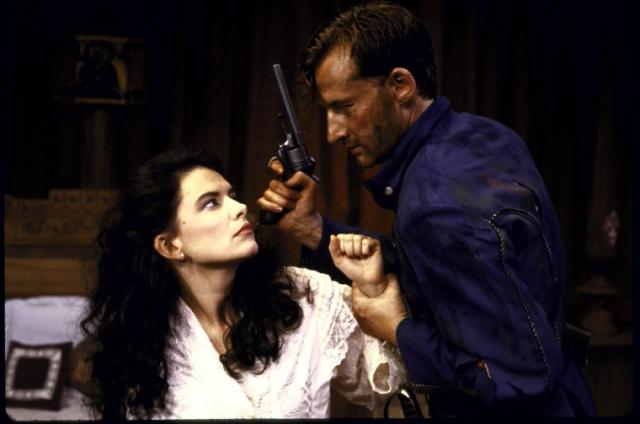
Arms and the Man, one of George Bernard Shaw’s earliest plays, was originally subtitled “a romantic comedy.” Correctly sensing that the public would get the wrong idea, the playwright redubbed the work “an anti-romantic comedy,” an appellation both clever and fitting. Love triangles, concealed passions, and gallantry take a back seat to Shaw’s estimation of what really makes a soldier or a lover.
Climbing up a water pipe to escape an advancing Bulgarian army, Swiss mercenary Captain Bluntschli finds himself in the bedroom of nubile Raina Petkoff. She, daughter of one Bulgarian major and engaged to another, receives the starving, filthy captain with surprising equanimity. She hides Bluntschli from her mother and the servants and becomes intrigued by his decidedly unheroic posture. In keeping with Shaw’s non-romantic notions, Bluntschli carries provisions instead of ammunition because, like all experienced soldiers, he knows the only true secret of successful warfare is staying quiet, low, and alive.
Ironically, Raina’s husband-to-be, Sergius, has followed the exact opposite course to unexpected victory. Filled with the bravery of foolish youth, Sergius wildly charged straight into the Serbian troops -- a move so suicidal it caught the highly professional Serbs utterly off guard. Bluntschli is gone by the time Raina’s father and boyfriend return home, but the intellectual kinship established between maiden and mercenary lingers and ultimately prevails. A fretting mother and baffled butler contribute farcical elements to this social comedy.
More interesting is Louka, the saucily feminist maid and one of the first true Shavian heroines. Without the example of Louka’s demanding approach to the men in her life, Raina would never have the courage to act on her own instincts regarding Sergius and Bluntschli. These days, Louka’s vim is hardly revolutionary, while Shaw’s jests, though witty, invite polite chuckles rather than hearty laughs. Arms and the Man does please, but one wonders how often the play would be revived if it didn’t have Shaw’s name on it. This production doesn’t allay my skepticism. The Roundabout cast do a workmanlike job, but the sense is that Frank Hauser has directed with a textbook in one hand and a leather-bound copy of the play in the other.
Dublin-born Roma Downey has a soothing, velvet voice that can’t help but lull even as it charms. She makes a winning Raina, but the sparks she strikes with Bluntschli have as much firepower as his unloaded gun. Part of the blame must go to Daniel Gerroll who brings a twinkle to his role as the Captain but not enough oomph.
On the other end of the scale, Barbara Andres and Christopher Noth are all too ready to indulge in slam-bang histrionics. Ms. Andres is acceptable as Raina’s perpetually nervous mother, but Mr. Noth’s Sergius gives us all the mannerisms of a comic performance with none of the style. Instead of investing Sergius with deliberate, showy hamminess, Mr. Noth merely demonstrates these traits with obvious gestures and increasing volume. In contrast, MacIntyre Dixon as Raina’s father offers a nice balance of form and foolishness. Catherine Christianson invests Louka with much-needed energetic spice.
As usual, the Roundabout has come up with an exceptionally attractive set, this one rich with exotic opulence. A glance at the program reveals that Franco Colavecchia designed the set for a City Opera production of Rasputin, so he’s made good use of his Baltic background.
Intrigue between masters and servants has been the crux of millions of plays stretching back to ancient times, while examinations of the modern sexual psyche have informed the majority of works written in the past twenty years. Arms and the Man falls somewhere in between, both chronologically and artistically. This production, though buoyed by a lively third act, suffers equally from understatement and overacting, making the play more anti-romantic than even Shaw must have intended.
